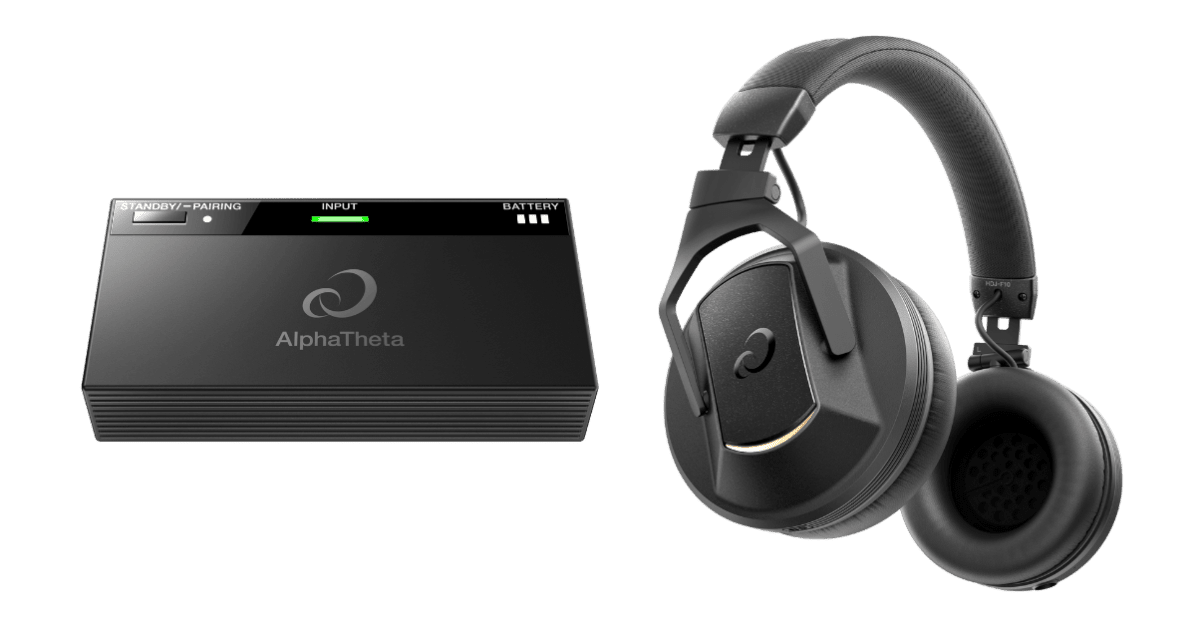The Lowdown
The HDJ-F10 headphones are an innovative release from AlphaTheta, combining the company’s new SonicLink wireless technology for wire-free DJing, with a competent pair of Bluetooth and general purpose headphones, which as a fallback can also be wired. They’re sturdy, reliable, and could well replace several pairs in the travel bag of many a touring DJ. Such headphones would really take off though if DJ gear started to come with SonicLink transmitters built-in. Watch this space…
Don’t have our latest DJ gear guide? Click here to grab your free copy
Video Review
First Impressions / Setting up
These are a heavy, over-ear, classic-feeling DJ headphone, all in black, with a fabric headband, and big earcups with deep isolating memory foam cushions. They have a chunky, almost gaming-like headphone design, and feel sturdy and well-built. If you’re happy with the big, heavy, over-ear style of DJ headphone, and would also be happy using this type of headphone for a daily driver, as many people are, then I think you’ll like them. They certainly feel like they’re going to be reliable.
AlphaTheta tells us that their goal with these headphones was to make one pair to replace the several pairs that the typical touring DJ might take with them. And as such, they work not only with Bluetooth or with a standard wired connection, but also using AlphaTheta’s new SonicLink technology to establish a wireless link between compatible DJ gear and the headphones – or alternatively, any DJ gear when the included SonicLink transmitter is plugged into it.
Read this next: 5 Modern Technologies That Are Making Wireless DJing Possible
As Bluetooth headphones, they have noise cancellation, voice control of an attached phone, the ability to take calls, and controls for volume and navigating a Bluetooth music source – all the standard stuff. And so in short, in theory at least, should indeed have everything that the pro DJ, especially the pro DJ on the move, might want in several pairs of headphones, all squashed into one.
In the box is a carry bag, a long straight cord, the transmitter (at least, it is there if you buy the version that comes with the transmitter), and two USB-C to USB-C cables so that the transmitter and headphones can both be charged at the same time. They come charged, but charging them takes 60 to 90 minutes for a nine-hour battery time. Finally, I nodded approvingly at the rather posh British accent that announces any changes to status when you turn the headphones on and start pressing the buttons!
In Use
The HDJ-F10s have two main modes, which are swapped between by a switch that’s hidden on the top of the left-hand earcup. In SonicLink mode, by pressing the button to link with them on a SonicLink transmitter (such as the one provided in the box, or presumably on any forthcoming SonicLink enabled DJ gear), and then pressing the button next to the SonicLink selection button on the left earcup, they will immediately pair.
Then effectively, it’s just like wearing a pair of wired headphones, because the latency you can hear is practically zero (it’s actually nine milliseconds). And the sound quality is exactly as you’d expect from a pair of AlphaTheta (formerly Pioneer DJ) headphones: Very good, in other words, with a definite emphasis on the bass. There is a slight white noise-style hiss, similar to that I identified when they have noise cancellation on in Bluetooth mode (see later on): It’s not going to be noticeable when DJing but it is nevertheless still there – something to be aware of if you think this may bother you.
Flip this button into the other position, and they become a standard set of Bluetooth headphones. In this mode again you can use the same button that you would use to pair SonicLink, but this time to pair to any Bluetooth device. I did that to my phone and found that everything worked reliably – the volume control, the music source control, voice control over the phone, calls, and so on.
The only thing I was less than impressed with was the noise cancellation, which is hissy and doesn’t seem to do too much over the top of the extremely good audio acoustic cancellation provided by the thick earcups. It certainly is not as good as that on my Apple AirPods Max.
The HDJ-F10s come with a cable that plugs into the SonicLink transmitter and then to your DJ gear to make the SonicLink work with anything. Alternatively, it can plug into the headphones and then directly into the DJ gear should either the headphones or the SonicLink transmitter run out of battery. This way you’ve always got an old-fashioned wired fallback with you by design.
That said, it’s a bit unwieldy having a really long cable between the headphone socket and the transmitter. I would have liked to have seen a nice little short cable, perhaps a coiled one, in the box to make that connection a little bit neater. But anyway, as provided, it works well.
Overall, having used them for a little while, I felt like despite these headphones containing a lot of smart tech, they do look and feel just like a standard DJ headphone. Everything else has been hidden quite subtly on them, and I think that is good. Pretty much everything works smoothly and well, including the way they remember the last thing you had them paired to in both SonicLink and Bluetooth next time you power them up.
Conclusion
These are a competent set of headphones, and I’d imagine they’re quite excited about them over at AlphaTheta. The company clearly thinks that SonicLink is going to be a big technology for them in the future, and certainly if they start to build the transmitters into their next iteration of DJ gear, headphones like this will make a lot of sense.
I would imagine that, for instance, if the next pro DJ mixer aimed at the DJ booth comes with SonicLink as an option, the HDJ-F10s are going to start flying off the shelves to DJs who DJ on that kind of gear primarily.
As they are though, SonicLink – while a little bit fiddly, and involving charging two units – may well appeal to certain DJs who really have never liked having a cable in the DJ booth. Certainly it’s reliable, the latency is impossible to notice and the battery life on both the transmitter and the receiver is high enough for it to last easily the longest night of DJing you can imagine, and for most DJs probably several sets.
Learn to DJ with us: The Complete DJ Course
As far as the day to day features go, this is stuff you’d expect from a headphone that looks outside of a specialist use case, and so there are no surprises: All features work as advertised. And although the noise cancelling isn’t the best, a design like this is pretty acoustically noise cancelling without the need for active noise cancelling anyway. I suspect the microphones aren’t up there with the best of class here, and that’s why.
AlphaTheta has been smart to make sure that there is a wired option as well, meaning all bases are covered at all times with these. So really, your question is whether it’s worth paying the extra for these headphones now with the transmitter so you can use them with any gear you’ve got, or maybe wait a year or two and see if the next generation of DJ gear comes with the transmitters built-in, in which case you can buy the headphones without having to spend the extra on that when the technology might be a bit proven.
In other words, are you an early adopter or not? If you are, and you like the design, and of course you’re a user of this company’s gear, you might want to take a punt on the HDJ-F10s. We’ve certainly enjoyed using them.


